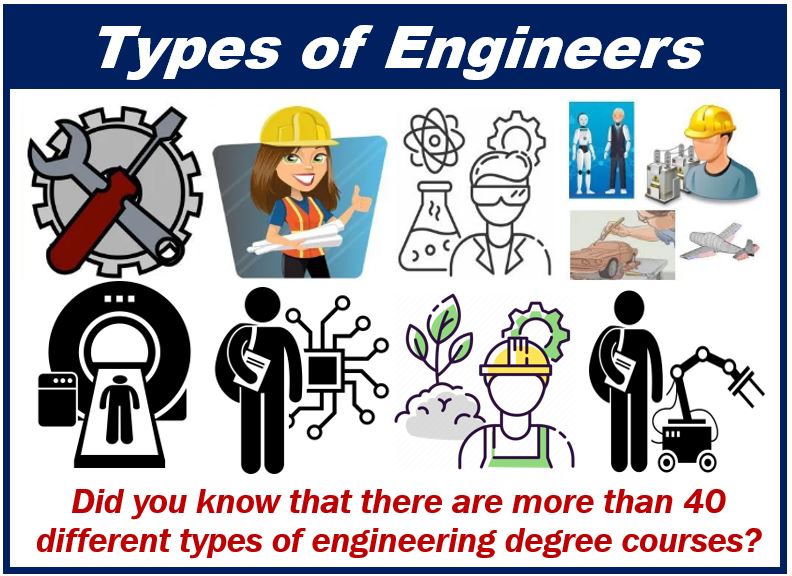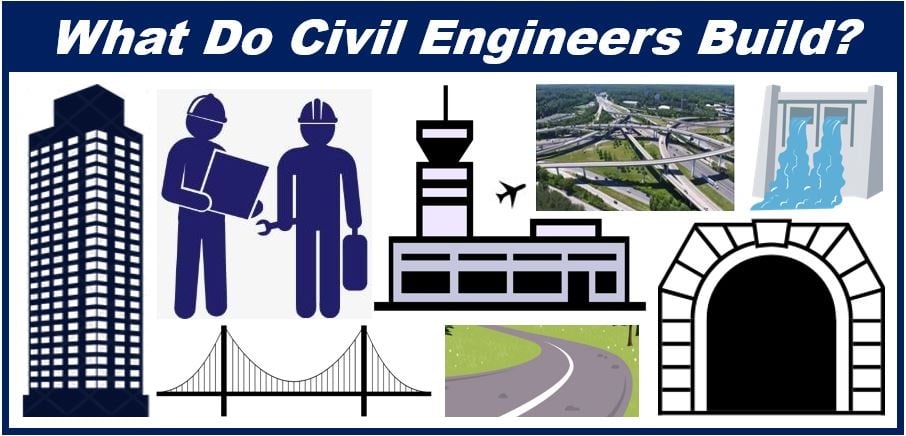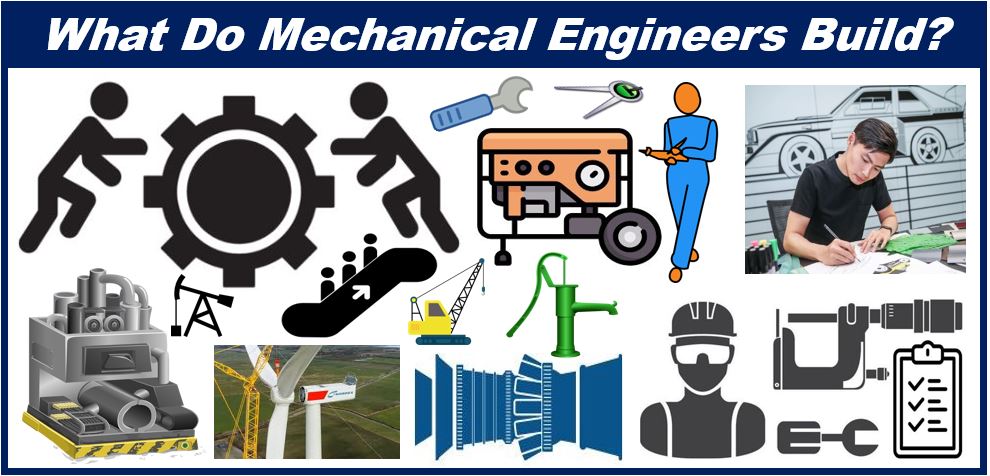Engineers use scientific principles to make machines and other structures such as factory equipment, bridges, and tunnels. An engineer may also be involved in the creation of pharmaceutical products, airplanes, vehicles, roads, dams, and robots.
Engineers are great problem solvers. They use mathematics and science to find solutions. They also work out how machines, devices, and other pieces of equipment function. Engineers are typically given the task of finding practical applications for new scientific discoveries, i.e., get them onto the market.

Although inventors such as scientists tend to get recognition for innovations, we should remember that in many cases engineers were the ones who found practical uses for their inventions.
Variety of engineers
There are dozens of different kinds of engineers. The meaning of the term may vary depending on the context, who uses the term, and where.
Some of them build great bridges or tunnels that connect, for example, England to France, while others make industrial chemicals, new vehicles, pharmaceuticals, electric circuits, power stations, wind farms, microchips, and food processing systems.
Below is a description of some common types of engineers:
Civil engineer

We have had civil engineers for thousands of years. Civil engineering involves designing, building, and also maintaining structures such as infrastructure items. The term infrastructure refers to roads, bridges, subways, and other systems and structures that we tend to take for granted.
If you go outside and look around, you will find that much of what you see exists thanks to the great work of civil engineers.
Columbia University in the City of New York says the following about the history of this profession:
“Civil engineering is arguably the oldest engineering discipline. It deals with the built environment and can be dated to the first time someone placed a roof over his or her head or laid a tree trunk across a river to make it easier to get across.”
Chemical Engineer
This type of professional is involved in the creation of pharmaceutical products (drugs) and industrial chemicals. Every food processing company has at least one chemical engineer.
They design, create, and then implement the systems for processing chemicals and other components that industry uses to make products that consumers and businesses buy.
The following quote comes from Stanford University in California:
“Chemical engineering is a discipline influencing numerous areas of technology. In broad terms, chemical engineers conceive and design processes to produce, transform, and transport materials — beginning with experimentation in the laboratory followed by the implementation of the technology in full-scale production.”
Industrial Engineer
As the name suggests, these professionals typically work in industry. Their main aim is to boost, for example, a factory’s efficiency, lower costs, and improve the quality of products.
Health and safety in the workplace is also part of an industrial engineer’s focus. Trying to reduce the risk of accupational hazards is part of their domain.
Global warming and pollution are concerns for millions of people around the world and their governments. New legislation now exists in the advanced economies and several emerging ones. These new laws aim to reduce pollution and carbon emissions by industry, other sectors, and also individuals and households. Industrial engineers implement strategies to improve eco-efficiency.
Another focus is compliance, which means complying with or adhering to (obeying) specific rules and regulations.
According to the US Bureau of National Statistics:
“Industrial engineers devise efficient systems that integrate workers, machines, materials, information, and energy to make a product or provide a service.”
Electrical Engineer
These engineers work on equipment, devices, and other tech that has electricity as its power source. They also focus on systems and the components that make up electrical and electronic devices. Most electronic devices or equipment have an electrical power source.
This is a wide-ranging profession. While one person may be currently building a giant power plant, another could be working on a tiny microchip.
The UK’s Universities and Colleges Admissions Service (UCAS) has the following job description of this profession:
“Electrical engineers work with high- and low-voltage equipment in a number of areas, such as transport networks, power generation, renewable energy sources, manufacturing and building services. ”
“They conduct feasibility studies, develop project plans, estimate costs and coordinate the work of technicians and craftspeople, among other duties.”
Mechanical Engineer

Mechanical engineers work in the design, creation, and implementation of mechanical systems. Much of their work involves studying objects in motion.
They are key employees in a number of different industries including, manufacturing, energy conversion, automotive, aerospace, shipbuilding, construction, medical devices, railways, and power.
Regarding the typical projects that this type of professional may be involved in, randstad.co.uk says the following:
“Mechanical engineers will typically find themselves working in engineering services, research and development, manufacturing and public sector organizations.”
“There are also significant numbers employed in general purpose machinery manufacturing, automotive parts manufacturing, testing laboratories and the armed forces.”
The future
The engineers of tomorrow will be quite different from the ones that have existed to date. Today, there are major innovations in artificial intelligence, machine learning, robotics, transportation, medicine, energy, communications, automation, and space travel and exploration. The wearable technology market is growing dramatically.
Engineers are very much involved in inventing, creating, and implementing the technologies of these new inventions. This will continue to be the case for many decades to come. However, in a few decades’ time, they will be quite different from the ones we currently have.
According to Stanford Engineering Professor and former Dean, James Plummer, master-level university courses will probably cease to exist.
Prof. Plummer explained:
“Instead, it will be about lifelong education and just-in-time knowledge, and that will be done online. Lifelong learning is essential. The half of life of engineering knowledge is three to five years.”
Prof. Plummer says that engineering courses should be broader. Students need to prepare for future careers, which will become more unpredictable.
Prof. Plummer added:
“Engineers will need communication skills, the ability to work in teams, global knowledge, and an entrepreneurial outlook as much as they will need technical depth.”
Image, not that long in the future, when the IoT has matured and steel and concreted have given way to smart materials. IoT stands for the Internet of Things.
“Engineer” is a derivative of “Engine”
From the English root word “engine,” there are many derivatives, including “engineer. Let’s have a look at them, their meanings, and how to use them in a sentence:
-
Engine (noun)
A machine designed to convert energy into useful mechanical motion.
Example: “The engine of the car was completely overhauled to improve its performance.”
-
Engineer (noun)
A professional who designs, constructs, and supervises the operation of engines, machines, structures, or public works.
Example: “The engineer presented the blueprints for the new bridge.”
-
Engineer (noun)
A person who operates or tends an engine (specifically on an aircraft or ship, but also other contexts).
Example: “As a marine engineer, he was responsible for maintaining the ship’s engines during the voyage.”
-
Engineering (noun)
The branch of science and technology concerned with the design, building, and use of engines, machines, and structures.
Example: “He decided to pursue a career in engineering because he was fascinated by how things work.”
-
Engineer (verb)
To design or construct in a skillful or clever way.
Example: “She engineered a new method for recycling plastic waste.”
-
Engineered (adjective)
Modified or constructed by an engineer.
Example: “The engineered materials will be used in the construction of the eco-friendly building.”
-
Engineless (adjective)
Lacking an engine.
Example: “The engineless glider soared silently through the sky.”
There are no common adverbs directly derived from “engine.”
Video – What is Engineering?
This video, from our YouTube partner channel – Marketing Business Network – explains what ‘Engineering’ is using simple and easy-to-understand language and examples.
